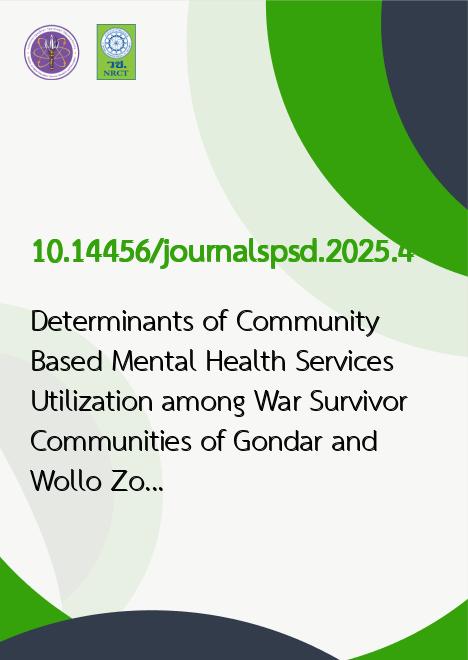
|
Determinants of Community Based Mental Health Services Utilization among War Survivor Communities of Gondar and Wollo Zones, Amhara Region |
|---|---|
| รหัสดีโอไอ | |
| Creator | Suleyman Beshir |
| Title | Determinants of Community Based Mental Health Services Utilization among War Survivor Communities of Gondar and Wollo Zones, Amhara Region |
| Publisher | Faculty of Social Administration, Thammasat University |
| Publication Year | 2568 |
| Journal Title | Journal of Social Policy, Social Change and Development |
| Journal Vol. | 3 |
| Journal No. | 1 |
| Page no. | 52-68 |
| Keyword | Community based mental health, Service utilization, Intention, War survivor community |
| URL Website | https://so10.tci-thaijo.org/index.php/journalspsd/issue/view/224 |
| Website title | Journal of Social Policy, Social Change and Development |
| ISSN | 2985-0800 |
| Abstract | The world faces serious challenges from mental health issues, with untreated illnesses often leading to increased morbidity and mortality. Lack of treatment for mental Illnesses comes from both accesses for the services and patients’ preference for the services. World Health Organization (WHO) recommended the Strength based and recovery oriented model called community-based health service (CBMHS) which even though h the response of people to CBMHS use varies across countries and communities. In addition, Ethiopia as a country and war prone communities in the country have their own unique dynamics of context which in turn determines patients’ intention to CBMHS. This study aimed at investigating the associated factors of CBMHS use intention among civil war affected zones of north Ethiopia. Absence of studies specifically on people’s responses for CBMHS was the rationale for choosing this study and the site.Quantitative approach with a cross sectional community survey design and questionnaire were used. The study used SPSS version 24 to analyze descriptive and inferential statistics designed to show the characteristics of the data and explain the association between the factors and CBMHS use intention. CBMHS use intention could be predicted by CMD, self-efficacy and self-concept, attitude, knowledge and expectancy, social norms and social constraints. People with common mental disorders have difficulty to develop intention of using CBMHS. Self-efficacy, self-concept, attitude towards CBMHS and expectancy contributes for the good intention of using CBMHS while knowledge has nothing to do with the intention of people to use CBMHS. Social norms and social constraints are found to be the barriers for the intention of people to consider CBMHS. With the absence of intention of people survived in the civil war to use CBMHS, it is meaningless to invest in any form of mental health services. It is invaluable to enhance self-efficacy, self-concept, attitude, and expectancy of people, and prevent the prevalence CMD, control social norms and social constraints through health and life skill education. Public health policies are imperative for the better utilization and intention of CBMHS in the war survivor community members. Social work services of all kind are important for the better utilization and intention of CBMHS in the war survivor community members. |